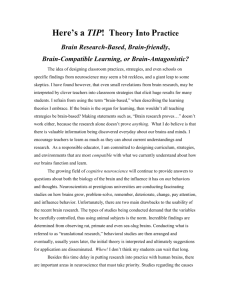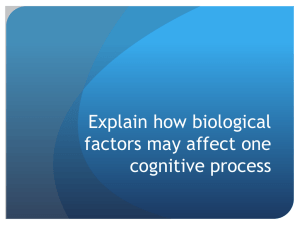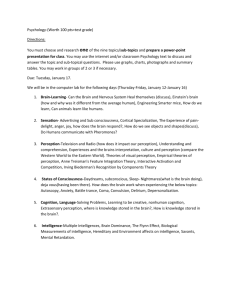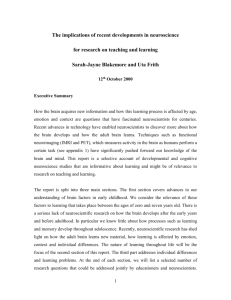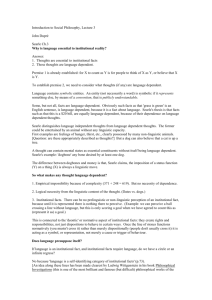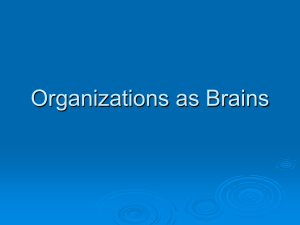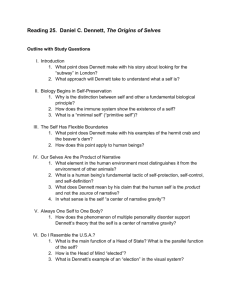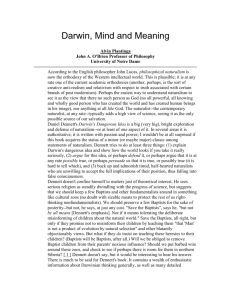Neuroscience and Philosophy: Brain, Mind and
advertisement
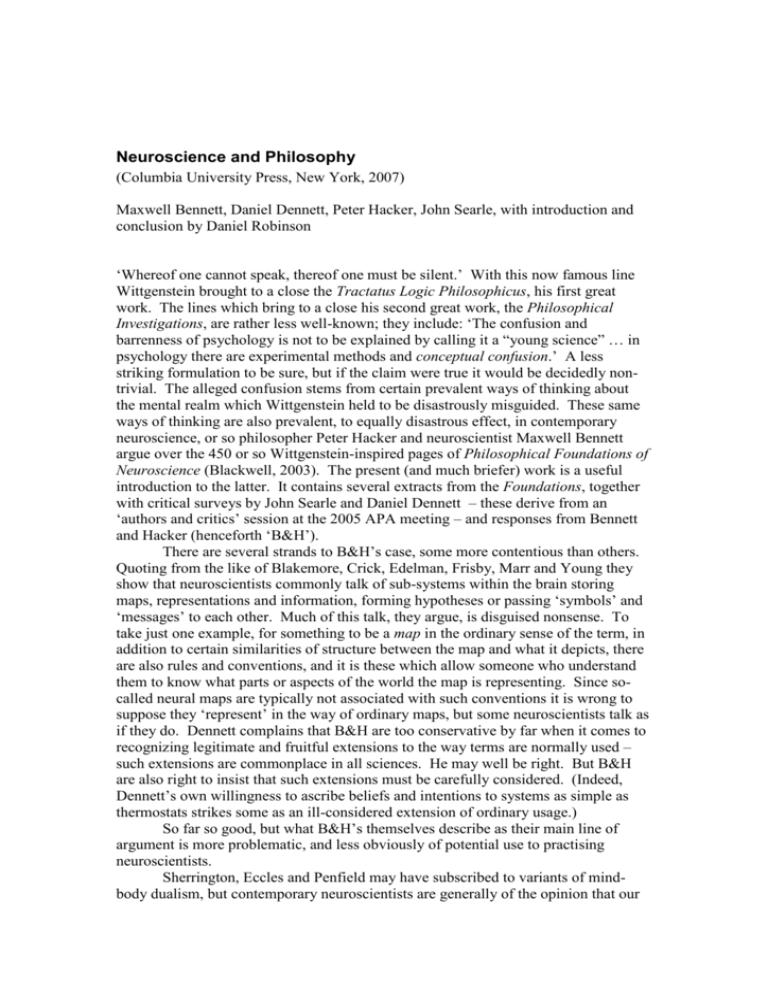
Neuroscience and Philosophy (Columbia University Press, New York, 2007) Maxwell Bennett, Daniel Dennett, Peter Hacker, John Searle, with introduction and conclusion by Daniel Robinson ‘Whereof one cannot speak, thereof one must be silent.’ With this now famous line Wittgenstein brought to a close the Tractatus Logic Philosophicus, his first great work. The lines which bring to a close his second great work, the Philosophical Investigations, are rather less well-known; they include: ‘The confusion and barrenness of psychology is not to be explained by calling it a “young science” … in psychology there are experimental methods and conceptual confusion.’ A less striking formulation to be sure, but if the claim were true it would be decidedly nontrivial. The alleged confusion stems from certain prevalent ways of thinking about the mental realm which Wittgenstein held to be disastrously misguided. These same ways of thinking are also prevalent, to equally disastrous effect, in contemporary neuroscience, or so philosopher Peter Hacker and neuroscientist Maxwell Bennett argue over the 450 or so Wittgenstein-inspired pages of Philosophical Foundations of Neuroscience (Blackwell, 2003). The present (and much briefer) work is a useful introduction to the latter. It contains several extracts from the Foundations, together with critical surveys by John Searle and Daniel Dennett – these derive from an ‘authors and critics’ session at the 2005 APA meeting – and responses from Bennett and Hacker (henceforth ‘B&H’). There are several strands to B&H’s case, some more contentious than others. Quoting from the like of Blakemore, Crick, Edelman, Frisby, Marr and Young they show that neuroscientists commonly talk of sub-systems within the brain storing maps, representations and information, forming hypotheses or passing ‘symbols’ and ‘messages’ to each other. Much of this talk, they argue, is disguised nonsense. To take just one example, for something to be a map in the ordinary sense of the term, in addition to certain similarities of structure between the map and what it depicts, there are also rules and conventions, and it is these which allow someone who understand them to know what parts or aspects of the world the map is representing. Since socalled neural maps are typically not associated with such conventions it is wrong to suppose they ‘represent’ in the way of ordinary maps, but some neuroscientists talk as if they do. Dennett complains that B&H are too conservative by far when it comes to recognizing legitimate and fruitful extensions to the way terms are normally used – such extensions are commonplace in all sciences. He may well be right. But B&H are also right to insist that such extensions must be carefully considered. (Indeed, Dennett’s own willingness to ascribe beliefs and intentions to systems as simple as thermostats strikes some as an ill-considered extension of ordinary usage.) So far so good, but what B&H’s themselves describe as their main line of argument is more problematic, and less obviously of potential use to practising neuroscientists. Sherrington, Eccles and Penfield may have subscribed to variants of mindbody dualism, but contemporary neuroscientists are generally of the opinion that our mental lives are material in nature and completely dependent upon neural goings-on in our brains. Yet B&H claim they nonetheless remain committed to a pernicious form of dualism. Why so? Because these same neuroscientists hold that brains themselves can think thoughts, have experiences, take decisions, hold grudges, remember past events and so forth. B&H claim this too is just nonsense. For it is not brains that have thoughts and experiences, it is human beings – i.e., whole human animals. B&H do not deny that our mental lives depend on our brains in a way that they do not depend upon activities elsewhere in our bodies, but they insist that to ascribe mental powers to brains is as senseless as it is to ascribe them to numbers. This claim will strike many as bizarre in the extreme. What are their grounds for making it? Their reasoning derives from Wittgenstein, who wrote: ‘Only of a human being and what resembles (behaves like) a living human being can one say: it has sensations; it sees, is blind; hears, is deaf; is conscious or unconscious’. Like Wittgenstein, B&H hold that when it comes to the correct ascription of mental states and processes, it is a subject’s capacities for publicly observable behaviour which are significant, not what is going on inside the subject (or their mind or consciousness). Simplifying only a little, since brains are incapable of the relevant forms of behaviour – they can’t walk, talk, flinch, point or run around – it is senseless to ascribe mental attributes to them. This neo-behaviourist conception of the mental is by no means obviously correct, to say the least. The idea that conscious states possess an inner, subjective and private character – a character that is essential to their being conscious states at all – is a very natural one. As Searle notes in his contribution, Wittgensteinians can plausibly be seen as conflating the external (behavioural) evidence for consciousness with the existence of consciousness. The defence B&H offer for this aspect of their position – in this volume at least – is uncompelling; they have a good deal more to say in the Foundations. This much-disputed topic aside, B&H’s attitude to the brain is vulnerable to a more straightforward objection. I am currently able to think. It seems very plausible to think that I would continue to have this ability if I were reduced to the condition of a healthy living brain (maintained by life-support machinery, say). If I am essentially a human being, as B&H suggest, then I am still a human being in my diminished condition. But since I am now indistinguishable from my brain – we are composed of precisely the same atoms – how can it be senseless to say that brains can think? If there’s nothing to distinguish me from my brain, won’t my brain be able to do everything I can do? Who’s doing all the thinking around here? Now they’re telling me I’m wrong to think I can think …
